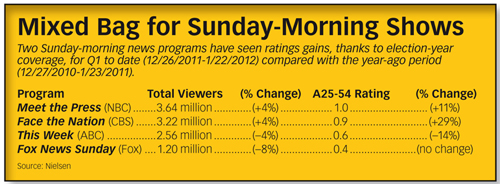Viewers Electing Not to Watch Yet

The smarter way to stay on top of broadcasting and cable industry. Sign up below
You are now subscribed
Your newsletter sign-up was successful
The 2012 presidential primary season has already been going on in earnest for nine months now, but so far it has been a slow build to get viewers beyond the political junkies interested in the action.
“It’s been challenging to get people interested in politics this year,” says Jon Banner, executive producer of ABC’s This Week. “That’s frustrating for those of us in the news business.”
Betsy Fischer, executive producer of NBC’s Meet the Press, adds: “I think this time we’ve seen interest maybe not as much earlier in the process. People are just now starting to tune in more and are becoming more engaged in things.”
There have been 19 GOP primary debates so far this election cycle, but despite the surfeit, some broadcast execs say it has helped spur viewer interest in the election.
“The only thing that has garnered any interest at all has been the debates,” Banner says.
Others, however, believe viewers may be growing weary. After hitting a viewership high for ABC’s Dec. 10 debate with 7.63 million viewers, the audience for debates has dropped off, although NBC’s Jan. 23 event came within about a half-million viewers of that December high.
“With the debate coverage you’ve seen a dropoff, I think, maybe just because there has been such a saturation of debates,” Fischer says.
But everyone can agree it has been great theater— and great for certain candidates, especially Newt Gingrich, who has taken to creating debates made for television by playing off the audience’s reactions and getting into heated exchanges with the moderators. And his performance seems to have paid off for him: In the South Carolina primary that Gingrich somewhat surprisingly won, 88 percent of voters said the debates were a factor in their decision.
“Newt Gingrich has really only lasted this long because of his performance in the debates,” Banner says. “These debates have given life to candidates where otherwise there wasn’t any.”
And that lifeline comes in the form of not only free TV publicity and increased voter interest, but the crucial aspect of fundraiser dollars.
“[Gingrich] is already one up on Lazarus; people declare him dead, and then he rises from the dead and he comes back,” jokes Bob Schieffer, anchor of CBS’ Face the Nation.
Though Gingrich came in a distant second to Mitt Romney in the Florida primary last week, Gingrich’s failure to concede defeat means everyone in TV news is not expecting him to drop out anytime soon, and in fact are hoping the Republican race lasts as long as possible. “It’s the best possible outcome for us; we want this to be a race,” Banner says.
“My only bias is to keep the story going and to have a great story to cover,” Fischer says. “Of course the longer it goes, the more interesting it is and the more there is for us to talk about on the program. Politics is bread and butter for Meet the Press so as long as that topic is top of people’s minds, that’s what we like.”
And there is, of course, the lingering possibility that the Republican race could go all the way to a brokered convention, something that hasn’t happened since 1976, when Ronald Reagan challenged President Gerald Ford.
If that happens, the August convention, which usually offers a lot of pomp and circumstance but not much else, would turn into a real news event.
“As a reporter, I hope it does [go to convention] because it just would be so much fun,” Schieffer says. “I kind of hope that is what happens.”
The smarter way to stay on top of broadcasting and cable industry. Sign up below
